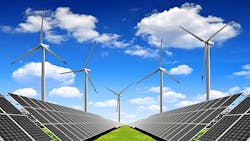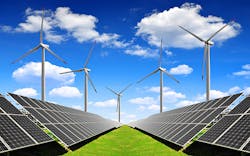Report: U.S. ‘Clean-Energy Revolution’ Making Historic Gains
America’s transition to a clean-energy economy is irrevocably under way and delivering deep pollution reductions, with coal use at record lows and the use of renewable energy greater than ever, the Natural Resources Defense Council’s (NRDC’s) fourth annual energy report says.
One sign of how far things have advanced: More than one-fifth of the U.S. population lives in a state with a goal of at least 50 percent renewable energy.
The report, “Accelerating Into a Clean Energy Future,” notes: “The United States is changing fundamentally across the energy sector, accelerating away from fossil fuels into a clean-energy future. The trend, obvious for more than a decade, is a combined product of state and federal policy harmonized with potent economic forces. Coal-fired generation dropped to historic lows this year, producing only one-third of our electricity, while renewable-energy generation reached record highs, with more than one-eighth of America’s electricity generated from solar panels, wind turbines, and other renewable resources.”
Ralph Cavanagh, co-director of the NRDC Energy Program and report co-author, said: “The nationwide momentum for pollution-free energy is undeniable and irresistible because clean energy now costs less than dirty energy. However, strong local, state, and federal policies are necessary for the United States to remain competitive globally and ensure clean-energy technology and employment surge to the highest possible levels here at home.”
Kala Viswanthan, co-author, added: “The past year in energy saw a number of victories for the environment, highlighted by a global climate agreement and a carbon-pollution-reduction plan for the United States. A clean-energy revolution is under way, decarbonizing the electric grid through carbon-reduction targets, energy-efficiency gains, and renewable-energy additions.”
The report notes: The “United States helped achieve a successful agreement at the historic global climate negotiations in Paris at the Conference of the Parties 21 (COP 21). The accord included greenhouse-gas- (GHG-) reduction targets for 195 nations after 2020, with the goal of avoiding the worst impacts of climate change. … For the United States, that means economywide cuts up to 28 percent below 2005 GHG-emissions levels by 2025. As energy-policy expert Michael Grunwald wrote shortly after the 2016 presidential election, ‘Even if (the United States were) to withdraw from the Paris climate deal, the U.S. is on track to fulfill its pledges under that deal.’”
As the report shows, smarter energy use in homes, buildings, and appliances reduces the need for dirty fuels and allows utilities to avoid building polluting power plants, lowering customer bills and emissions levels. The United States has worked to reduce pollution from the transportation sector by improving vehicle efficiency through standards, advancing cleaner fuels, promoting electric-vehicle use, and improving land-use practices.
According to the report, oil consumption in 2015 was 12 percent below its 2005 peak. Primarily as a result of historically low coal use, energy-efficiency gains, and soaring generation from solar and wind, 2015 marked a milestone in modern U.S. history: Carbon-dioxide emissions from electricity generation dropped below those of the entire transportation sector for half of the year.
To continue the nation’s clean-energy progress, the report urges:
- In both international and domestic policy, the federal government to remain an active partner in a clean-energy transition driven increasingly by the recognition clean energy is cheaper than dirty energy.
- States to strengthen renewable-portfolio standards requiring a specific amount of energy generation from emissions-free sources such as wind and solar and adopt strong energy-efficiency policies for U.S. homes, buildings, and appliances and equipment.
- Utilities and their regulators to curb power-plant emissions and prioritize renewable energy and energy efficiency.
- The transportation sector to incentivize electric vehicles and strengthen fuel-economy standards to continue reducing U.S. reliance on oil.
- Clean-energy companies and businesses to lead the way, creating jobs for the sustainable-energy economy.
The report is available at https://www.nrdc.org/resources/nrdcs-annual-energy-reports.

